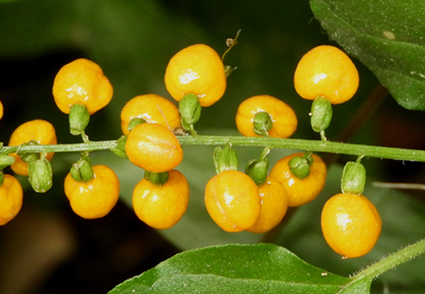Abstract
The ITS and cpDNA sequences were obtained for three taxa of the family Phytolaccaceae, viz. Rivina bengalensis S.C.Srivast. & T.K.Paul, R. humilis L. var. humilis, and R. humilis var. bracteata D.Maity, Sonia Mitra, Manasi Mandal & Maiti. The MLtree strongly supports the Rivina humilis clade, which includes R. bengalensis and R. humilis var. bracteata. The synonymization of R. bengalensis is supported by both molecular and morphological data. The accessions of Rivina humilis var. bracteata group together in the R. humilis clade, but the results also show inter-population variation, which primarily supports the varietal status of the taxon. The broadly oblanceolate bracts which is abruptly narrowed from middle or above middle into a long subulate to narrowly triangular, acuminate apical lobe make the variety distinct from typical R. humilis. The combined rbcL and trnH-psbA dataset reveal congruent result for the sequenced Rivina spp. Present study is the first report on molecular systematics of R. humilis from India.
References
- Annapoorani, A., Koodalingam, A., Beulaja, M., Saiprasad, G., Chitra, P., Stephen, A., Palanisamy, S., Prabhu, N.M., You, S.G., anarthanan, S. & Manikandan, R. (2022) Eco-friendly synthesis of zinc oxide nanoparticles using Rivinahumilis leaf extract and their biomedical applications. Process Biochemistry 112: 192–202. https://doi.org/10.1016/j.procbio.2021.11.022
- Chase, M.W. & Hills, H.H. (1991) Silica gel: An ideal material for field preservation of leaf samples for DNA studies. Taxon 40 (2): 215–220. https://doi.org/10.2307/1222975
- Darriba, D., Taboada, G.L., Doallo, R. & Posada, D. (2012) jModelTest 2: more models, new heuristics and parallel computing. Nature Methods 9: 772. https://doi.org/10.1038/nmeth.2109
- Dwivedi, M.D., Barfield, S., Pandey, A.K. ,& Schaefer. H. (2018) Phylogeny of Zehneria (Cucurbitaceae) with special focus on Asia. Taxon 67: 55–65. [H1] https://doi.org/10.12705/671.4
- Deshmukh, U.B. & Rathor, O.S. (2017) Rivina humilis var. bracteata D. Maity et al. (Phytolaccaceae), A new distributional record for (Maharashtra) India. Bioscience Discovery 8 (3): 486–487.
- Doyle, J.J. & Doyle, J.L. (1987) A rapid DNA isolation procedure for small quantities of fresh leaf tissue. Phytochemical Bulletin 19: 11–15.
- Katoh, K. & Standley, D.M. (2013) MAFFT multiple sequence alignment software version 7: improvements in performance and usability. Molecular Biology and Evolution 30 (4): 772–80. https://doi.org/10.1093/molbev/mst010
- Khan, M.I. & Giridhar, P. (2014) Enhanced chemical stability, chromatic properties and regeneration of betalains in Rivina humilis L. berry juice. LWT - Food Science and Technology 58 (2): 649–657. https://doi.org/10.1016/j.lwt.2014.03.027
- Kress, W.J. & Erickson, D.L. (2007) A two-locus global DNA barcode for land plants: The coding rbcL gene complements the non-coding psbA-trnH spacer region. PLoS One 2 (6): e508. https://doi.org/10.1371/journal.pone.0000508
- Lee, J., Kim, S.Y., Park, S.H. & Ali, M.A. (2013) Molecular phylogenetic relationships among members of the family Phytolaccaceae sensu lato inferred from internal transcribed spacer sequences of nuclear ribosomal DNA. Genetics and Molecular Research 12 (4): 4515–4525. https://doi.org/10.4238/2013.February.28.15
- Linnaeus, C. (1753) Species Plantarum. Ed.1. Laurentius Salvius. Sweden, pp. 121–122.
- Mabberley, D.J. (2017) Mabberley’s Plant Book – a portable dictionary of flowering plants and their classification and uses. 4th edn. Cambridge University Press, Cambridge, 799 pp. https://doi.org/10.1017/9781316335581
- Maddison, W.P. & Maddison, D.R. (2015) Mesquite: A modular system for evolutionary analysis, version 3.40. https://mesquiteproject.org
- Mandal, M., Mitra, S., Maiti, G.G. & Maity, D. (2014) A new variety of Rivina humilis and the status of R. bengalensis (Phytolaccaceae). Rheedea 24 (2): 99–104.
- Moquin (1849) Phytolaccaceae. In: De Candolle A. (Ed.) ProdromusSystematisNaturalisRegniVegetabilis. Vol. 13(2). Paris, SumptibusVictoris Masson, pp. 2–40.
- Miller, M.A., Pfeiffer, W. & Schwartz, T. (2010) The CIPRES science gateway. Proceedings of the Gateway Computing Environments Workshop (GCE). New Orleans, LA. ACM Press, New York, NY, pp. 1–8.
- Peterson, P.M., Romaschenko, K., Herrera, A.Y. &Saarela, J. (2014) A molecular phylogeny and new subgeneric classification of Sporobolus (Poaceae: Chloridoideae: Sporobolinae). Taxon 63: 1212–1243. https://doi.org/10.12705/636.19
- Sang, T., Crawford, D.J. & Stuessy, T.F. (1997) Chloroplast DNA phylogeny, reticulate evolution and biogeography of Paeonia (Paeoniaceae). American Journal of Botany 84: 1120–1136. https://doi.org/10.2307/2446155
- Srivastava, S.C. & Paul, T.K. (2003) Rivina bengalensis- a new species from India. Indian Journal of Forestry 26 (4): 357–358.
- Stamatakis, A. (2014) RAxML version 8: A tool for phylogenetic analysis and post-analysis of large phylogenies. Bioinformatics 30: 1312–1313. https://doi.org/10.1093/bioinformatics/btu033.
- Stanford, A.M., Harden, R. & Parks, C.R. (2000) Phylogeny and biogeography of Juglans (Juglandaceae) based on matK and ITS sequence data. American Journal of Botany 87: 872–882. https://doi.org/10.2307/2656895
- Tate, J.A. & Simpson, B.B. (2003) Paraphyly of Tarasa (Malvaceae) and diverse origins of the polyploid species. Systematic Botany 28: 723– 737. https://doi.org/10.1043/02-64.1
- Walter, H. (1909) Phytolaccaceae. In: Engler, A. (Ed.) Das Pflanzenreich. Vol. 39 (IV.83), Leipzig, pp. 1–154.
- White, T.J., Bruns, T.D., Lee, S. & Tayler, J. (1990) Amplification and direct sequencing of fungal ribosomal RNA genes for phylogenetics. In: Innis, M.A. & Gelfand, D.H. (Eds.) PCR protocols: a guide to methods and applications. Academic Press, London, pp. 315–322.


